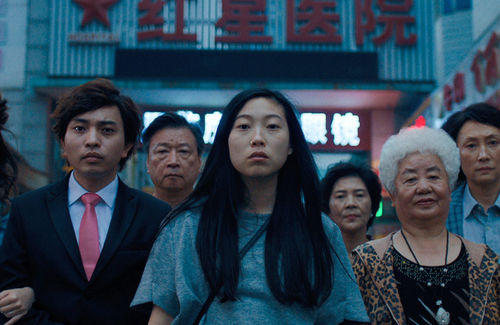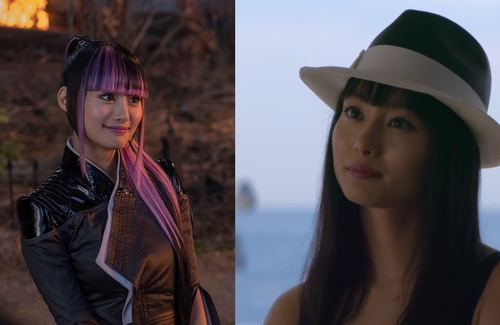Asians in Hollywood: “The Farewell”

If you only had three months left to live, would you want to know? According to The Farewell, it’s common to spare a loved one from a terminal diagnosis in China – and it’s not illegal.
The film, “based on an actual lie” from director Lulu Wang’s life, centers on Billi, portrayed by Crazy Rich Asians star Awkwafina. Billi is an aspiring writer in her 20s from a middle-class family who emigrated from China to New York when she was just six. Falling behind on her rent and rejected for a Guggenheim Fellowship, Billi struggles to meet the frustrating expectations of her parents, played by Tzi Ma (馬泰) and Diana Lin (林晓杰). And just when things couldn’t get worse, she learns Nai Nai, played by Shuzhen Zhao (赵淑珍), her grandmother in China has Stage 4 lung cancer and only a short while left to live.
Despite Billi’s objection, the family decides to follow Chinese tradition and keep Nai Nai in the dark about her terminal illness. Instead, they stage an elaborate family gathering – the wedding of Billi’s cousin, Hao Hao, portrayed by Chen Han – to see Nai Nai for the first time in years before she passes. Afraid Billi will spoil their ruse, her parents leave her behind in New York, but Billi defies their order and flies solo to Changchun to join her relatives and see her beloved Nai Nai.
While in China, Billi has no choice but to go along with the deception, however, the deliberate dishonesty towards her grandmother causes her to feel guilty, and continuously question the morality of it all. The internal turmoil Billi faces represents the clashes between the Western culture and Chinese culture, a theme prevalent in the film.
At one point, Billi points out keeping the medical diagnosis from the patient would be illegal in America. However, her uncle Haibin, played by Jiang Yongbo (姜永波), contends that the family is bearing the emotional burden for Nai Nai by lying. It’s an eastern concept of collectivism that Nai Nai practiced when her husband was also diagnosed with a terminal illness. Haibin tells Billi that spilling the secret will only rid Billi of her guilt, as she’s thinking from an individualist point of view – common in Western culture. Though both Billi and the audience gained a better understanding of the deception through this conversation, it’s still a dilemma that they toy with throughout the film.
But Billi’s visit to China is about so much more than just her Nai Nai and exploring cultural differences – it was one of personal growth. Awkwafina’s stunning portrayal of an immigrant revisiting her homeland and straddling two cultures reminds viewers that as beautiful as it is to have a “hyphenated” identity, finding a sense of belonging is difficult when you are seen as a foreigner in the places you call home. Everything Billi remembers about her homeland is demolished, and even her native tongue betrays her – she sticks out like a sore thumb with her poor Mandarin skills, similar to many Asian Americans in reality.
Though Awkafina trades in her comedic image for one that’s serious and solemn in The Farewell, her fish out of water performance coupled with her comic timing makes the movie a dramedy. With dark humor scattered throughout the heavy film, you’ll find yourself wiping away your tears to laugh at the lighthearted jokes and silly nuances. Seeing Nai Nai, a dying woman, argue for lobster to be served at the wedding to save face was a much-needed intermission from the heartbreaking moments. Unaware of her fate, the matriarch was busy concerning herself with wedding planning and even grew concerned about the awkwardness between her grandson and his soon-to-be-bride. She even wondered how the engaged couple acts behind closed doors when she’s not there advocating for some affection.
Playful, powerful, and moving, The Farewell taps into a completely different realm compared to the much-appreciated growing wave of Asian American-focused rom coms. As I watched the tear-inducing scene of Billi and her parents bid farewell to Nai Nai, I looked around the theater, made up of a very diverse audience clearly moved by the film. It was then and there that I realized The Farewell is not just a film for Asian Americans but everyone, thanks to its universally relatable theme of complicated family dynamics, identity, and death.
This article is written by MelodyC, and is part of a new feature, “Asians in Hollywood” at JayneStars.com.








Awkafina looks okay here, way better than her CRA look and over the top acting. not bad. i didn’t know not telling someone that they have a terminal disease was a taboo in china. no wonder why some chinese person i know suspected of having the disease decided to not get a proper diagnosis
She looks good here.. I will be watching this movie.. Not bad.
I watched this two weeks ago, it was awesome. Awkwafina is doing quite well in Hollywood, and this performance was very good.
I can hardly wait to see this movie, heard about it, seen some previews on Showbiz Korea, she was also featured on Good Morning America. She is humorous, funny, but now this serious drama is a feature to watch. Wishing her and the rest of the cast, Good Luck, and continued success with this movie in America. So glad to see the Asians getting credit for job well done for a change, they deserve it, they do work hard at their craft, hoping to see more film productions coming our way. This appears to me as a shot in the arm for families facing many dilemmas, but when it hits close to home, when granny is seriously ill, they are basically the glue of any family as I’m getting chicken skin typing this, with all due respect and honor cause I miss my gung gung, my granny, my tutu, my mom; don’t know how we would’ve managed without all of them, still good memories, lasting till my days as a granny, I’ll remember also this movie too. Thank you, Xie Xie, Mahalo, peace & happiness.
I am also interested in this movie. All the press has been really good. The interviews with Lulu Wong are inspiring.
Do we live by our own moral beliefs or those a Country sets?